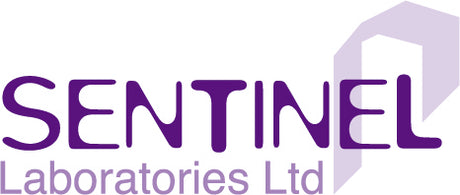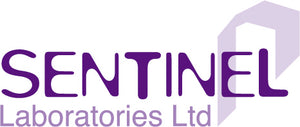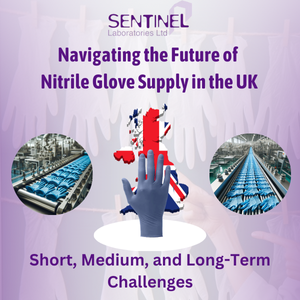Understanding Accelerators in Gloves: What They Are and How They Impact Users
At Sentinel Laboratories Ltd, we have been at the forefront of hand protection for over 35 years. Known as specialists in gloves and skin health, we were the first company in the UK to import nitrile gloves in the early 1990s, setting a new standard for disposable glove performance and safety. Over the years, we have built a reputation for delivering innovative solutions that prioritise user health and comfort. One critical area of expertise we focus on is addressing the potential risks of accelerators in disposable gloves.
In this blog, we will explore what accelerators are, why they are used in glove manufacturing, and how they can impact sensitive individuals. We will also discuss accelerator-free gloves, their benefits, and why some users may still experience reactions. Finally, we will examine other potential causes of skin irritation from glove use.
What Are Accelerators in Gloves?

Common Types of Accelerators
1. Thiurams
-
Examples: Tetramethylthiuram disulfide (TMTD) and tetraethylthiuram disulfide (TETD).
-
Purpose: Act as primary accelerators, increasing the speed of vulcanisation.
- Potential Reactions: Thiurams are known allergens, often causing Type IV hypersensitivity reactions, such as delayed contact dermatitis.
2. Carbamates
-
Examples: Zinc dibutyldithiocarbamate (ZDBC), zinc diethyldithiocarbamate (ZDEC).
-
Purpose: Enhance the performance of primary accelerators.
- Potential Reactions: Often linked to allergic skin reactions, carbamates are frequently implicated in glove-related sensitivities.
3. Mercaptobenzothiazoles (MBTs)
-
Examples: 2-Mercaptobenzothiazole, zinc mercaptobenzothiazole (ZMBT).
-
Purpose: A common accelerator used in nitrile glove manufacturing for strength and elasticity.
- Potential Reactions: MBTs can cause both irritation and allergic reactions, making them a key concern for individuals with sensitivities.
Accelerator-Free Gloves: Are They Truly Free?

-
Washing: High-quality washing processes remove residual chemicals to levels that are often undetectable.
- Chlorination: This treatment further minimizes chemical residues, enhancing the safety and comfort of the gloves.
The Residual Risk
Despite these advanced manufacturing processes, trace amounts of accelerators may remain in some gloves. For individuals with heightened sensitivities, even these negligible levels can trigger reactions. At Sentinel Laboratories, we work closely with manufacturers to source gloves with the lowest residual accelerator content, ensuring maximum safety and comfort for our clients. The Kimtech range of nitrile gloves have imperceptible levels of accelerators and are classified as accelerator free.
Other Causes of Skin Reactions from Gloves

If an individual reacts to gloves labelled as accelerator-free, the cause might not be accelerators. Here are some other potential culprits:
1. Soap or Residue Contamination
-
Issue: Residual soap when washing hands can get trapped on the skin, which may appear that the gloves are causing irritation.
- Solution: At Sentinel Laboratories, we can advise on all aspects of skin care to find the correct solution for you and your workforce.
2. Sweat and Occlusion
-
Issue: Gloves create a sealed environment that traps moisture and heat, leading to maceration (softened, soggy skin) and irritation.
- Solution: We recommend using moisture-wicking silk glove liners or breathable gloves to reduce discomfort.
3. Heat Buildup
-
Issue: The heat generated by prolonged glove wear can exacerbate irritation, especially for those with sensitive skin.
- Solution: Sentinel Laboratories offers gloves designed for comfort and reduced heat retention, ideal for extended use.
4. Friction
-
Issue: Ill-fitting gloves can cause rubbing and friction, leading to irritation.
- Solution: Selecting the correct glove size is crucial, and we provide detailed sizing guidance to help users find their perfect fit.
5. Individual Sensitivities
-
Issue: Some individuals may be sensitive to the base material of the gloves (e.g., nitrile, latex, or vinyl).
- Solution: Sentinel Laboratories supplies a range of hypoallergenic gloves to cater to diverse needs.
Preventing Skin Reactions: Sentinel’s Expertise
As pioneers in glove technology and skin health, Sentinel Laboratories is committed to providing solutions that protect both hands and skin. Our decades of experience mean we understand the complexities of glove materials and manufacturing. Here is how we help:
1. Innovative Glove Options: We offer a variety of high-quality gloves, including true accelerator-free options.
2. Custom Solutions: We work closely with clients to identify gloves that suit their specific needs, minimizing the risk of reactions.
3. Education: We empower users with knowledge about glove-related skin health, ensuring informed decision-making
Conclusion
Understanding accelerators and their role in glove manufacturing is essential for selecting gloves that prioritize protection and comfort. At Sentinel Laboratories Ltd, we have spent over three decades helping clients navigate the complexities of hand protection. As the first company in the UK to import nitrile gloves, we continue to lead the way in offering innovative, skin-friendly solutions.
If you are experiencing skin reactions or looking for the glove suppliers for your needs, contact us at Sentinel Laboratories Ltd. With our expertise, you can trust that your hands are in safe hands.





Leave a comment